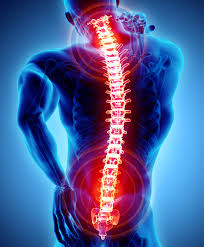gandhisays
Stage Pro
Researchers have found that combining human growth hormone and physical therapy helps people with severe spinal damage recover faster. The results of the study presented to the European Endocrinology Society show that daily treatment with GH produced significant positive changes in sensory functions of the spinal structure. GH triggers the production of a chemical by the pituitary gland which helps in the regeneration of new nerves. Although the findings are not conclusive, there is overwhelming evidence that this method could be used in the future to fully treat people with the condition. This article will discuss the efficiency of Growth Hormone Therapy in managing various types of spinal injury.
About Severe Spinal Injury
Spinal injury is a result of a series of interferences of parts of the nervous system. Denervation, which is the loss of nerve activity in the affected region’, is the most obvious sign that the injury is severe, and thus can be described as traumatic. Once the human muscle starts losing some nerve components such as endplates and myofibrils, its atrophy changes significantly. Atrophy is known to increase with the level of denervation and this will eventually render one virtually immobile.
It is important to note that prolonged spinal injuries are harder to reverse because reinnervation becomes quite difficult. Even in the case of growth hormone therapy, the success of the procedure depends on the length of the period before intervention. That is to say that the sooner a spinal injury is addressed using any medically approved method the better. The process of axonal generation, which is essential in maintaining a healthy spine, is greatly affected by the affected nerve’s inability to secrete neurotrophic chemicals. The lack of neurotrophic chemicals weakens the bungner bands, further complicating recovery from traumatic spinal damage.
Related Article: Human Growth Hormone Role In Bodybuilding
Axonal Regeneration
Axonal regeneration is the only sure way of treating the spinal injury. Several therapies have been proposed and experimented with to fix the condition but the results have not been satisfactory. Most of the methods tested have only managed to accelerate axonal generation have only done so to a certain level. However, scientists and physicians are still carrying out more experiments to find a method that will help regenerate these important elements to the desired level.
Efficacy of Growth Hormone (HG) in Nerve Regeneration
Among all therapeutic methods tested so far, injection with the growth hormone has been found to have greater success in increasing nerve regeneration for patients with spinal injury. Naturally, the growth hormone is produced by the pituitary gland. However, the body’s ability to produce the hormone may be hindered by factors such as old age, poor diet, or injury. As mentioned earlier, the hormone plays an important role in nerve regeneration. Therefore, its levels can be boosted through the administration of a synthetic growth hormone.
Additionally, people who have suffered from traumatic spinal injury tend to produce an amount of hormone that is below normal levels. This phenomenon is quite strange and scientists continue to try and find out the reason behind it. Nevertheless, such patients with this problem can be injected with synthetic growth hormone to cater to the deficit. In addition to increasing GH to the required levels, the treatment enhanced nerve regeneration to maintain denerved muscles in patients whose nerves have been compromised.
> > HUMAN GROWTH HORMONE
Researchers have found that combining human growth hormone and physical therapy helps people with severe spinal damage recover faster. The results of the study presented to the European Endocrinology Society show that daily treatment with GH produced significant positive changes in sensory functions of the spinal structure. GH triggers the production of a chemical by the pituitary gland which helps in the regeneration of new nerves. Although the findings are not conclusive, there is overwhelming evidence that this method could be used in the future to fully treat people with the condition. This article will discuss the efficiency of Growth Hormone Therapy in managing various types of spinal injury.
About Severe Spinal Injury
Spinal injury is a result of a series of interferences of parts of the nervous system. Denervation, which is the loss of nerve activity in the affected region’, is the most obvious sign that the injury is severe, and thus can be described as traumatic. Once the human muscle starts losing some nerve components such as endplates and myofibrils, its atrophy changes significantly. Atrophy is known to increase with the level of denervation and this will eventually render one virtually immobile.

It is important to note that prolonged spinal injuries are harder to reverse because reinnervation becomes quite difficult. Even in the case of growth hormone therapy, the success of the procedure depends on the length of the period before intervention. That is to say that the sooner a spinal injury is addressed using any medically approved method the better. The process of axonal generation, which is essential in maintaining a healthy spine, is greatly affected by the affected nerve’s inability to secrete neurotrophic chemicals. The lack of neurotrophic chemicals weakens the bungner bands, further complicating recovery from traumatic spinal damage.
Related Article: Human Growth Hormone Role In Bodybuilding
Axonal Regeneration
Axonal regeneration is the only sure way of treating the spinal injury. Several therapies have been proposed and experimented with to fix the condition but the results have not been satisfactory. Most of the methods tested have only managed to accelerate axonal generation have only done so to a certain level. However, scientists and physicians are still carrying out more experiments to find a method that will help regenerate these important elements to the desired level.
Efficacy of Growth Hormone (HG) in Nerve Regeneration
Among all therapeutic methods tested so far, injection with the growth hormone has been found to have greater success in increasing nerve regeneration for patients with spinal injury. Naturally, the growth hormone is produced by the pituitary gland. However, the body’s ability to produce the hormone may be hindered by factors such as old age, poor diet, or injury. As mentioned earlier, the hormone plays an important role in nerve regeneration. Therefore, its levels can be boosted through the administration of a synthetic growth hormone.

Additionally, people who have suffered from traumatic spinal injury tend to produce an amount of hormone that is below normal levels. This phenomenon is quite strange and scientists continue to try and find out the reason behind it. Nevertheless, such patients with this problem can be injected with synthetic growth hormone to cater to the deficit. In addition to increasing GH to the required levels, the treatment enhanced nerve regeneration to maintain denerved muscles in patients whose nerves have been compromised.
>> HUMAN GROWTH HORMONE <<
The Research
18 patients, each with traumatic spinal injury, were subjected to a study over six months. The growth hormone level in 13 of the patients was found to be below normal; a condition known as Growth Hormone Deficiency (GHD). To correct this deficiency, the patients were injected with one dose a day of artificial growth hormone for six months. Their recovery process was monitored after the first three months. The patients were also put into several categories according to age, body mass index (BMI), and waist circumference.
This was necessary because the natural production of the growth hormone varies with the parameters above. As mentioned earlier, the patients also underwent physical therapy sessions to achieve better results. To assess the recovery of the patients, researchers performed simple motor and spinal injury tests. It was established that patients who got a growth hormone injection showed great improvements within just three months of treatment. By the sixth month, most of the patients were fully cured of their spinal injuries.
In similar research, Lewis rats were put into four groups to be examined. The first group served as a negative control and the other three were to be subjected to various tests as follows.
The four groups were subjected to grip tests weekly for fourteen weeks. Among the parameters being tested in the experiment include:
In summary, researchers found out the following from the two tests:
1 Growth hormone enhances axon regeneration.
2 Growth hormone therapy helps maintain chronically denerved muscles.
3 Growth promotes motor reinnervation.
4 Growth hormone enhances functional recovery.
Cumulatively, the effects of the growth hormone help people with severe spinal injuries recover faster. However, the treatment is most helpful when combined with other forms of treatment.
More Research Needed
 Although the experiments above have shown the efficacy of the growth hormone in spinal damage treatment, the strategy is still under scientific scrutiny. The results above cannot be relied on fully due to several factors. For instance, the experiment conducted using Lewis rats cannot be used to tell what would happen in the case of humans. Additionally, the sample size was too small to give conclusive and reliable results on the matter. These are only preliminary results but it is a clear indication that there is hope in the near future.
Although the experiments above have shown the efficacy of the growth hormone in spinal damage treatment, the strategy is still under scientific scrutiny. The results above cannot be relied on fully due to several factors. For instance, the experiment conducted using Lewis rats cannot be used to tell what would happen in the case of humans. Additionally, the sample size was too small to give conclusive and reliable results on the matter. These are only preliminary results but it is a clear indication that there is hope in the near future.
Up until this study, it was widely believed in the medical world that damaged axons cannot be repaired. If this treatment method is finally approved, it will be a major game-changer in the medical world. Patients with traumatic spinal injury will no longer feel condemned to the wheelchair forever, thanks to the muscle-maintaining abilities of the growth hormone.
Alternative Therapeutic Treatments
As mentioned earlier, various methods have been tested to determine their efficacy in the treatment or management of severe spinal injuries. Growth hormone therapy is only one of the several methods that are still being studied regarding the condition. However, it is important to note that the nature of treatment depends on the severity of the condition. Severe cases of the condition can be managed through surgery and the use of assistive devices that enable affected people to live normal lives without depending on others entirely. Here are some alternative treatments for the condition.
Immobilization
This method is used to stabilize the spine by bringing it into proper alignment. This is done using various equipment such as a special bed or a rigid collar.
Surgery –
Spinal surgery is a treatment method for the condition aimed at removing bone fragments and other unwanted materials in the injured area. The method is also used to stabilize the spine and prevent deformities arising from the injury.
Hydrotherapy –
In cases where the patient experiences a lot of pain, water is used to relieve the pain. That can be done by soaking in a hot tub or mineral bath.
Intravenous IV Methylprednisolone Treatment –
This is by far the most potent non-surgical treatment method for the condition ever found. The treatment is exclusively designed for mild spinal injuries that do not need surgery. However, the chemical has been found to have severe side effects on the patient such as pneumonia and blood clotting. For this reason, the treatment has been largely stopped.
Rehabilitation –
Although technically not a treatment method, rehabilitation has helped people recovering from spinal injury face the journey. A team of professionals such as a dietitian, physical therapist, and rehabilitation nurse usually take care of the patient in the early stages of recovery.
Electrical Stimulation Devices –
Sometimes people with severe spinal injuries cannot move their arms and legs. However, with special electrical stimulation devices, such people can stand, walk, and grip objects without difficulty.
Conclusion
Enhances Recovery of Patients with Spinal DamageTraumatic spinal injury happens to many people around the globe annually through accidents and bodily complications. Given the sensitivity of the spinal structure, surgery is never an easy option, hence the need to try safer methods such as growth hormone therapy. As mentioned, treatment with GH has not been approved fully but it is something that can be used in the meantime. The best thing about this method is that it doesn’t come with nasty side effects.
Click here to view the article.
About Severe Spinal Injury
Spinal injury is a result of a series of interferences of parts of the nervous system. Denervation, which is the loss of nerve activity in the affected region’, is the most obvious sign that the injury is severe, and thus can be described as traumatic. Once the human muscle starts losing some nerve components such as endplates and myofibrils, its atrophy changes significantly. Atrophy is known to increase with the level of denervation and this will eventually render one virtually immobile.
It is important to note that prolonged spinal injuries are harder to reverse because reinnervation becomes quite difficult. Even in the case of growth hormone therapy, the success of the procedure depends on the length of the period before intervention. That is to say that the sooner a spinal injury is addressed using any medically approved method the better. The process of axonal generation, which is essential in maintaining a healthy spine, is greatly affected by the affected nerve’s inability to secrete neurotrophic chemicals. The lack of neurotrophic chemicals weakens the bungner bands, further complicating recovery from traumatic spinal damage.
Related Article: Human Growth Hormone Role In Bodybuilding
Axonal Regeneration
Axonal regeneration is the only sure way of treating the spinal injury. Several therapies have been proposed and experimented with to fix the condition but the results have not been satisfactory. Most of the methods tested have only managed to accelerate axonal generation have only done so to a certain level. However, scientists and physicians are still carrying out more experiments to find a method that will help regenerate these important elements to the desired level.
Efficacy of Growth Hormone (HG) in Nerve Regeneration
Among all therapeutic methods tested so far, injection with the growth hormone has been found to have greater success in increasing nerve regeneration for patients with spinal injury. Naturally, the growth hormone is produced by the pituitary gland. However, the body’s ability to produce the hormone may be hindered by factors such as old age, poor diet, or injury. As mentioned earlier, the hormone plays an important role in nerve regeneration. Therefore, its levels can be boosted through the administration of a synthetic growth hormone.
Additionally, people who have suffered from traumatic spinal injury tend to produce an amount of hormone that is below normal levels. This phenomenon is quite strange and scientists continue to try and find out the reason behind it. Nevertheless, such patients with this problem can be injected with synthetic growth hormone to cater to the deficit. In addition to increasing GH to the required levels, the treatment enhanced nerve regeneration to maintain denerved muscles in patients whose nerves have been compromised.
> > HUMAN GROWTH HORMONE
Researchers have found that combining human growth hormone and physical therapy helps people with severe spinal damage recover faster. The results of the study presented to the European Endocrinology Society show that daily treatment with GH produced significant positive changes in sensory functions of the spinal structure. GH triggers the production of a chemical by the pituitary gland which helps in the regeneration of new nerves. Although the findings are not conclusive, there is overwhelming evidence that this method could be used in the future to fully treat people with the condition. This article will discuss the efficiency of Growth Hormone Therapy in managing various types of spinal injury.
About Severe Spinal Injury
Spinal injury is a result of a series of interferences of parts of the nervous system. Denervation, which is the loss of nerve activity in the affected region’, is the most obvious sign that the injury is severe, and thus can be described as traumatic. Once the human muscle starts losing some nerve components such as endplates and myofibrils, its atrophy changes significantly. Atrophy is known to increase with the level of denervation and this will eventually render one virtually immobile.

It is important to note that prolonged spinal injuries are harder to reverse because reinnervation becomes quite difficult. Even in the case of growth hormone therapy, the success of the procedure depends on the length of the period before intervention. That is to say that the sooner a spinal injury is addressed using any medically approved method the better. The process of axonal generation, which is essential in maintaining a healthy spine, is greatly affected by the affected nerve’s inability to secrete neurotrophic chemicals. The lack of neurotrophic chemicals weakens the bungner bands, further complicating recovery from traumatic spinal damage.
Related Article: Human Growth Hormone Role In Bodybuilding
Axonal Regeneration
Axonal regeneration is the only sure way of treating the spinal injury. Several therapies have been proposed and experimented with to fix the condition but the results have not been satisfactory. Most of the methods tested have only managed to accelerate axonal generation have only done so to a certain level. However, scientists and physicians are still carrying out more experiments to find a method that will help regenerate these important elements to the desired level.
Efficacy of Growth Hormone (HG) in Nerve Regeneration
Among all therapeutic methods tested so far, injection with the growth hormone has been found to have greater success in increasing nerve regeneration for patients with spinal injury. Naturally, the growth hormone is produced by the pituitary gland. However, the body’s ability to produce the hormone may be hindered by factors such as old age, poor diet, or injury. As mentioned earlier, the hormone plays an important role in nerve regeneration. Therefore, its levels can be boosted through the administration of a synthetic growth hormone.

Additionally, people who have suffered from traumatic spinal injury tend to produce an amount of hormone that is below normal levels. This phenomenon is quite strange and scientists continue to try and find out the reason behind it. Nevertheless, such patients with this problem can be injected with synthetic growth hormone to cater to the deficit. In addition to increasing GH to the required levels, the treatment enhanced nerve regeneration to maintain denerved muscles in patients whose nerves have been compromised.
>> HUMAN GROWTH HORMONE <<
The Research
18 patients, each with traumatic spinal injury, were subjected to a study over six months. The growth hormone level in 13 of the patients was found to be below normal; a condition known as Growth Hormone Deficiency (GHD). To correct this deficiency, the patients were injected with one dose a day of artificial growth hormone for six months. Their recovery process was monitored after the first three months. The patients were also put into several categories according to age, body mass index (BMI), and waist circumference.
This was necessary because the natural production of the growth hormone varies with the parameters above. As mentioned earlier, the patients also underwent physical therapy sessions to achieve better results. To assess the recovery of the patients, researchers performed simple motor and spinal injury tests. It was established that patients who got a growth hormone injection showed great improvements within just three months of treatment. By the sixth month, most of the patients were fully cured of their spinal injuries.
In similar research, Lewis rats were put into four groups to be examined. The first group served as a negative control and the other three were to be subjected to various tests as follows.
- Subjected to chronic denervation for eight weeks, followed by nerve transfer (ulnar-to-median).
- Underwent denervation for 8 weeks and thereafter treated with 0.6g/day of purified GH alongside Ulnawr-to-median nerve transfer.
- Did not undergo chronic denervation but were subjected to ulnar-to-median nerve transfer from the start.
- Served as the baseline and was used for naïve controls.
The four groups were subjected to grip tests weekly for fourteen weeks. Among the parameters being tested in the experiment include:
- Median nerve regeneration.
- Neuromuscular junction reinnervation.
- Flexor digitorum superficialis atrophy.
In summary, researchers found out the following from the two tests:
1 Growth hormone enhances axon regeneration.
2 Growth hormone therapy helps maintain chronically denerved muscles.
3 Growth promotes motor reinnervation.
4 Growth hormone enhances functional recovery.
Cumulatively, the effects of the growth hormone help people with severe spinal injuries recover faster. However, the treatment is most helpful when combined with other forms of treatment.
More Research Needed

Up until this study, it was widely believed in the medical world that damaged axons cannot be repaired. If this treatment method is finally approved, it will be a major game-changer in the medical world. Patients with traumatic spinal injury will no longer feel condemned to the wheelchair forever, thanks to the muscle-maintaining abilities of the growth hormone.
Alternative Therapeutic Treatments
As mentioned earlier, various methods have been tested to determine their efficacy in the treatment or management of severe spinal injuries. Growth hormone therapy is only one of the several methods that are still being studied regarding the condition. However, it is important to note that the nature of treatment depends on the severity of the condition. Severe cases of the condition can be managed through surgery and the use of assistive devices that enable affected people to live normal lives without depending on others entirely. Here are some alternative treatments for the condition.
Immobilization
This method is used to stabilize the spine by bringing it into proper alignment. This is done using various equipment such as a special bed or a rigid collar.
Surgery –
Spinal surgery is a treatment method for the condition aimed at removing bone fragments and other unwanted materials in the injured area. The method is also used to stabilize the spine and prevent deformities arising from the injury.
Hydrotherapy –
In cases where the patient experiences a lot of pain, water is used to relieve the pain. That can be done by soaking in a hot tub or mineral bath.
Intravenous IV Methylprednisolone Treatment –
This is by far the most potent non-surgical treatment method for the condition ever found. The treatment is exclusively designed for mild spinal injuries that do not need surgery. However, the chemical has been found to have severe side effects on the patient such as pneumonia and blood clotting. For this reason, the treatment has been largely stopped.
Rehabilitation –
Although technically not a treatment method, rehabilitation has helped people recovering from spinal injury face the journey. A team of professionals such as a dietitian, physical therapist, and rehabilitation nurse usually take care of the patient in the early stages of recovery.
Electrical Stimulation Devices –
Sometimes people with severe spinal injuries cannot move their arms and legs. However, with special electrical stimulation devices, such people can stand, walk, and grip objects without difficulty.
Conclusion
Enhances Recovery of Patients with Spinal DamageTraumatic spinal injury happens to many people around the globe annually through accidents and bodily complications. Given the sensitivity of the spinal structure, surgery is never an easy option, hence the need to try safer methods such as growth hormone therapy. As mentioned, treatment with GH has not been approved fully but it is something that can be used in the meantime. The best thing about this method is that it doesn’t come with nasty side effects.
Click here to view the article.









